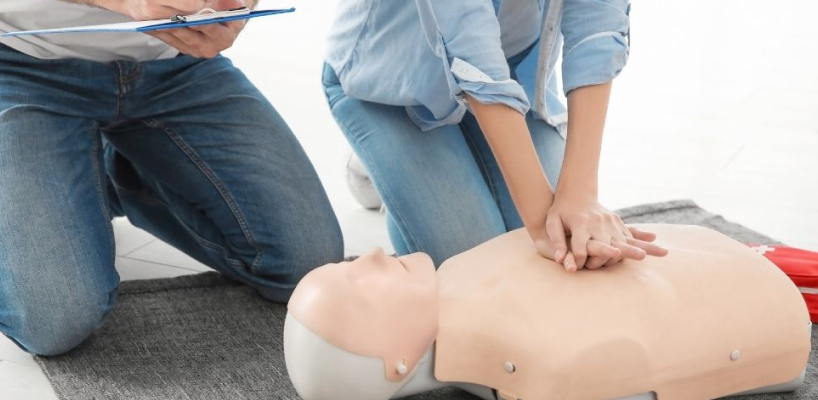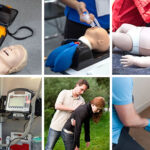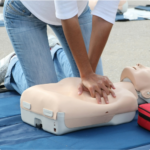
- Last Updated On: May 29, 2024
Everything you need to know about Nurse BLS certification
In the United States alone, cardiac arrest is the cause of 475,000 deaths annually. In today’s medical space, the role of nurses requires comprehensive Basic Life Support certification. This is for more than just skill acquisition. A Nurse BLS certification teaches aspiring and professional nurses the fundamental skills to intervene during any emergency. There are several studies that highlight the effectiveness of prompt BLS (Basic Life Support) interventions. With quick BLS administrations, nurses can help increase the chance of survival for patients by almost 40%.
In this blog we will help you navigate through the journey of acquiring and obtaining a nurse BLS certification with ease and efficacy.
What is the course curriculum of a Nurse BLS Certification?
An ideal Nurse BLS certification course equips healthcare providers with the essential knowledge and skills for rapid intervention. The program will also need you to have CPR certification validity, as the modules will be updated with industry standards.
Below mentioned are the points that are effectively covered in a Nurse BLS Certification. –
- Introduction to BLS: An overview of the importance of BLS in healthcare settings and the role of nurses in providing basic life support.
- Cardiopulmonary Resuscitation (CPR): Instruction on performing high-quality CPR techniques for adults, children, and infants, including chest compressions, rescue breathing, and the use of automated external defibrillators (AEDs).
- Airway Management: Training on clearing obstructed airways and providing effective ventilation using various methods, such as mouth-to-mouth or bag-valve-mask ventilation.
- Recognition and Response to Cardiac Arrest: Education on recognizing the signs of cardiac arrest and initiating the appropriate response sequence, including calling for help, assessing responsiveness, and initiating CPR.
- Use of AEDs: Hands-on practice with automated external defibrillators (AEDs), including how to operate the device safely and effectively during cardiac emergencies.
- Team Dynamics and Communication: Training on effective teamwork and communication strategies during resuscitation efforts, emphasizing clear roles and responsibilities among healthcare providers.
- Special Considerations: Instruction on special situations that may arise during resuscitation efforts, such as managing cardiac arrest in special populations (e.g., pregnant women, pediatric patients) and addressing ethical considerations.
- Written Examination and Skills Evaluation: Assessment of participants’ knowledge and skills through a written exam and hands-on skills evaluation to ensure competency in BLS techniques.
Read More: What to expect from an ideal BLS course format?
Overall, the Nurse BLS Certification course provides nurses with the essential knowledge and skills to confidently respond to cardiac emergencies and contribute to improved patient outcomes in healthcare settings.
What is the Nurse BLS certification validity?
After completing the Nurse Basic Life Support (BLS) Certification course, healthcare professionals often wonder about the validity period. Here’s a breakdown of the typical validity duration for Nurse BLS Certification:
- Certification Duration: Nurse BLS Certification is typically valid for a period of two years from the date of successful completion of the course.
- Renewal Requirement: To maintain an active Nurse BLS Certification, healthcare professionals are required to renew their certification every two years.
- Renewal Process: The renewal process usually involves completing a BLS renewal course, which includes reviewing essential BLS concepts, practicing skills, and passing a renewal exam.
- Continuing Education: Some certification providers may require completion of continuing education credits related to basic life support or related healthcare topics as part of the renewal process.
- Skills Evaluation: Depending on the certification provider, renewal may also involve demonstrating proficiency in BLS skills through a skills evaluation session.
- Expiration Reminder: Healthcare professionals are often notified in advance of their certification expiration date, allowing them ample time to complete the renewal requirements and maintain their certification status.
Read More: Is CPR Certification Legit?
Conclusion
The nurse Basic Life Support (BLS) certification helps you become prepared and proficient. This blog has hopefully equipped you with the right insights to navigate through the process of signing up for a nurse basic life support certification course. Before you begin your journey, know that getting Basic Life Support certified isn’t just a requirement, it is choosing to commit to a path meant for excellent patient care. By staying informed and updated about the guidelines and protocol you easily uphold the highest standard of practice yourself. If you are seeking renewal or a newcomer to this field, you can begin today by taking the first step towards enrollment. With the right dedication and diligence, you can become an expert and ace the skills of basic life support.






